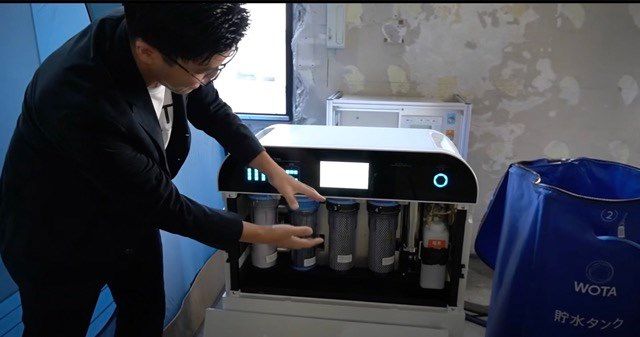Tokyo start up aims to provide alternative water infrastructure
Editor's note: Regional Correspondent Thomas Manglona filed a series of reports from Japan as part of the Association for Promotion of International Cooperation’s Japan Journalism Fellowship. View our full series here: https://youtube.com/playlist?l

Editor's note: Regional Correspondent Thomas Manglona filed a series of reports from Japan as part of the Association for Promotion of International Cooperation’s Japan Journalism Fellowship. View our full series here: https://youtube.com/playlist?list=PLZojCMmMkWJ0ANVtIq5FBJ21mK4F3tadJ&si=cv6MINc6qDmvFFFV
WOTA (a play on the word “water”) got its start when a group of young engineers realized that Japan has a big problem: Its water infrastructure is rapidly aging – and so is its population.
Vice President of Incubation Ryo Yamada said, "We need to renew infrastructure and that infrastructure investment is going to increase. But at the same time, what is happening all around Japan is that we are losing population, so the revenue from water rates is going to decrease rapidly."
WOTA has launched two products so far. One is the WOTA BOX, a portable water recycling system that can be used in disaster sites and rural areas. Its proprietary filtration system provides a reusable supply of clean water for washing hands and for showers.
Another product, called the WOSH, is a self-contained handwashing station that recycles water.
The company says the WOTA BOX has helped over 20,000 people in disaster areas, while more than 3 million people have used the handwashing unit, especially during the pandemic.
WOTA says that one hurdle has been convincing people that recycled water is safe to use.
Executive officer and head of Global Strategy said, "Using water reuse is not something that we do…because reuse is not put in place by the government yet. So it helps to bring social acceptance. You touch it, you see it, you see it is quite safe at least for grey water. And we hope that in the coming years, regulations slowly evolve to allow using reused water because it is kind of one of the biggest obstacles to use the reuse."
WOTA’s next product is a standalone water recycling system for homes and businesses. It can supply water off-the-grid, and also replace large, centralized water systems.
"The very simple concept is that if we could build something where we can recycle the water that is being used in your home on-site then we would not need the large system that we have today," Yamada added.
Three rural municipalities in Japan already use WOTA’s technology. And the company is in discussions with 20 more Japanese communities.
WOTA also wants to work with island nations burdened by dwindling access to fresh water and costly infrastructure.
